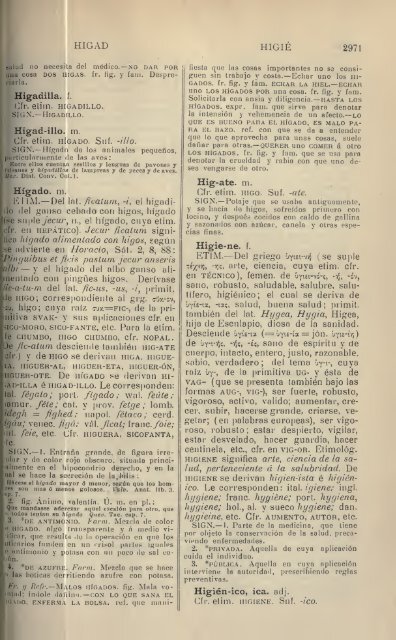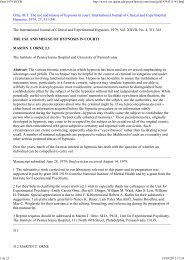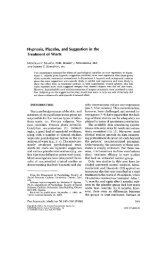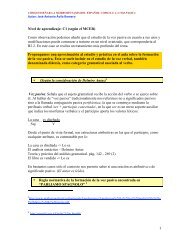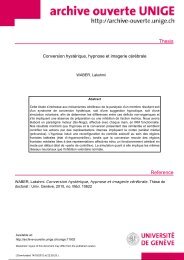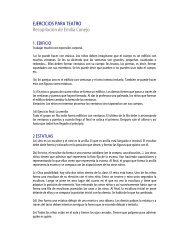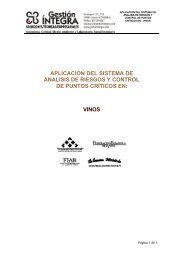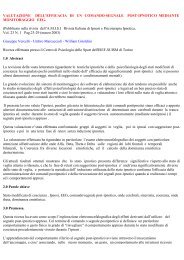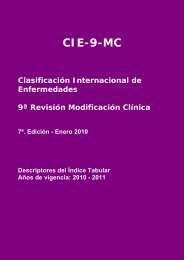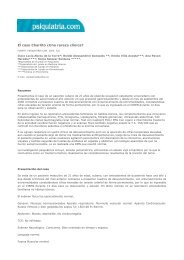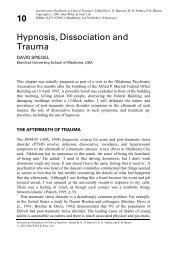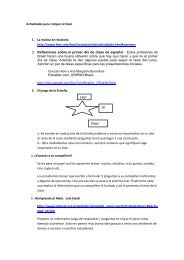Diccionario filológico-comparado de la lengua castellana
Diccionario filológico-comparado de la lengua castellana
Diccionario filológico-comparado de la lengua castellana
You also want an ePaper? Increase the reach of your titles
YUMPU automatically turns print PDFs into web optimized ePapers that Google loves.
HIGAD HIGIE 2971<br />
salud no necesita <strong>de</strong>l médico.— no dar por<br />
una cosa dos higas, fr. fig. y fam. Despreciar<strong>la</strong>.<br />
Higadil<strong>la</strong>, f.<br />
(]fr. eliin. higadillo.<br />
SIGN.— Higadillo.<br />
Higad-illo. m.<br />
CJv. eliin. HÍGADO. Siif. -U/o.<br />
SIGX.— Hígado <strong>de</strong> los animales pequeños,<br />
piíiliculiinnenle <strong>de</strong> <strong>la</strong>s aves:<br />
Kntre ellos cuentan sesillos y <strong>lengua</strong>s <strong>de</strong> pavones y<br />
faisanes y higadillos <strong>de</strong> <strong>la</strong>mpreas y <strong>de</strong> peces y <strong>de</strong> aves.<br />
Me.r. Dial. Conv. Col.L<br />
i<br />
;<br />
Hígado, ni.<br />
FJ IM.— Del \n{. ficatum, -i, el fiigadi-<br />
! lío <strong>de</strong>l güiiso cehmio con higos, hígado<br />
j'l{se s,u\Ae Jécur, n., el hígado, cuya etim.<br />
rcír. en hepático). Jécur ficatum signi-<br />
!lic9 Jugado a/ imentado con higos, z^^xxn<br />
se advierte en Horacio, Sót. 2, 8, 88:<br />
u^inguibus et ficis pastum jécur anseris<br />
%lbi — y el hígado <strong>de</strong>l albo ganso ali-<br />
[inentado con pingües higos. Derívase<br />
iñc-a-tu-m <strong>de</strong>l <strong>la</strong>t. fic-us, -us, -/, primit.<br />
j<strong>de</strong> higo; correspondienle al gi-g. sx/.-^v,<br />
;-:'j, higo; cuya i-níz c;jy.=Fic-, <strong>de</strong> <strong>la</strong> pri-<br />
'iniliva SVAK- y sus aplicaciones cfr. en<br />
Í3IC0-M0RO, sico-FANTE, etc. Pura <strong>la</strong> elim.<br />
le CHUMBO, higo chumbo, cfr. NOPAL.<br />
De Jic-atum <strong>de</strong>scien<strong>de</strong> también hig-ate<br />
cír.) y <strong>de</strong> higo se <strong>de</strong>rivan higa, higuera,<br />
higuek-al, higüer-eta, higuer-ón,<br />
hguek-ote. De hígado se <strong>de</strong>rivan hi-<br />
AD-iLLA éHiGAD-iLLo. Le coiTespon<strong>de</strong>u:<br />
tal. fégato; porl. figado ; wal. feúte ;<br />
mmur. féie; cat. y prov. fetge ; lomb.<br />
ulegli = fighed; napol. fétaco ; cerd.<br />
igáu; venec. figá; \(\\. Jicat; íranc./o/e;<br />
mt. feie, etc. Cfr. higuera, sicofanta,<br />
le.<br />
SiGN.— I. Entraña gran<strong>de</strong>, <strong>de</strong> figura irreu<strong>la</strong>r<br />
y <strong>de</strong> color rojo otjscuro, situada princialmente<br />
en el hipocondrio <strong>de</strong>recho, y en <strong>la</strong><br />
ual se hace <strong>la</strong> secreción <strong>de</strong> <strong>la</strong>.lúlis:<br />
Hácese el hígado mayor ó menor, segrún que los homres<br />
son mas ó menos golosos. V9IV. Anat. lib. 3,<br />
ap. 7.<br />
2. fig. Ániínn, valentía. Ú. m. en pl.<br />
Que mandasse a<strong>de</strong>rezar aquel escalón para otro, que<br />
o lodos tenían su hígado Qtieu. Tac. cap. 7.<br />
3. *<strong>de</strong> anti.vio.nio. tarín. Mezc<strong>la</strong> <strong>de</strong> color<br />
e hígado, algo transparente y á medio vi-<br />
•ilicar, (|iie resulta .le l.i operación on que los<br />
olicarios fun<strong>de</strong>n en un < r¡.í;i -»5?, -U^ sano <strong>de</strong> espíritu y <strong>de</strong><br />
cuerpo, intacto, entero, justo, razonable,<br />
sabio, verda<strong>de</strong>ro; <strong>de</strong>l tema 'JY'^-, cuya<br />
raíz yv-, <strong>de</strong> <strong>la</strong> primitiva ug- y ésta <strong>de</strong><br />
VAG- (que se presenta también bajo <strong>la</strong>s<br />
foimas AUG-, VIG-), ser fuerte, robusto,<br />
vigoroso, activo, valido; aumentar, crecer,<br />
subir, hacerse gran<strong>de</strong>, criarse, vegetar;<br />
(en pa<strong>la</strong>bras europeas), ser vigoroso,<br />
robusto; estar <strong>de</strong>spierto, vigi<strong>la</strong>r,<br />
estar <strong>de</strong>sve<strong>la</strong>do, hacer guardia, hacer<br />
centine<strong>la</strong>, etc., cfr. en vig-or. Etimológ.<br />
HIGIENE significa arte, ciencia <strong>de</strong> <strong>la</strong> salud,<br />
perteneciente á <strong>la</strong> salubridad. De<br />
HIGIENE se <strong>de</strong>rivan higien-ista é higién-<br />
ico, [.e coi-respon<strong>de</strong>n: \{q^. igiene; ingl.<br />
hygiene; franc. hygiéne; port. hygiena,<br />
hygiene; hol., al. y sueco hygiene; dan.<br />
hygieine, etc. Cfr. aumento, autor, etc.<br />
SiGN.— 1. Parte <strong>de</strong> <strong>la</strong> medicina, que tiene<br />
por objeto <strong>la</strong> conservación <strong>de</strong> <strong>la</strong> salud, precaviendo<br />
enfermeda<strong>de</strong>s.<br />
2. *privada. Aquel<strong>la</strong> <strong>de</strong> cuya aplicación<br />
cuida el individuo.<br />
3. *PÜBLICA. .\quel<strong>la</strong> en cuya aplicación<br />
interviene <strong>la</strong> autoridad, prescribiendo reg<strong>la</strong>s<br />
preventivas.<br />
Higién-ico, ica. adj.<br />
Cfr. etim. HIGIENE. Suf. -ico.


